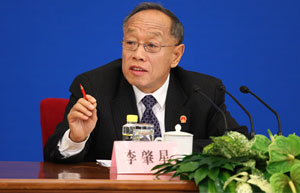Quake relief assistance
(China Daily)
Updated: 2011-03-15 07:57
As a close neighbor, separated only by a strip of water, China has been deeply concerned by the loss of life and devastation caused by earthquake that hit Japan on March 11. On Monday, Premier Wen Jiabao again offered his deep condolences to the Japanese people and more help if needed.
Wen was among the first group of world leaders to send letters of condolence to his Japanese counterpart. China has shipped relief goods to Japan, and its rescue team started search and rescue operations on Monday morning in the city of Ofunato in Japan's northeastern Iwate Prefecture.
| ||||
As an earthquake-prone country itself, China understands the difficulties Japanese people are living through and hope they will soon emerge from the dark shadow of the quake and begin reconstruction.
The 9.0-magnitude earthquake and subsequent tsunami remind us of the fact that nature's face can be ferocious and that we should always be vigilant. Experts point out that since the 2004 Pacific tsunami, our planet may have once again entered an earthquake-active period. In 2010 alone, a total of 28 earthquakes with a magnitude over 7 were recorded.
While the affected areas in Japan brace for more aftershocks, the country is also being afflicted by another earthquake-engendered crisis - nuclear radiation. A meltdown was feared at its Fukushima nuclear plant after it was rocked by the quake.
Japan has rated the Fukushima accident at 4 on the 1-7 International Nuclear and Radiological Event Scale - meaning an accident with local consequences - the 1986 Chernobyl disaster was 7.
Japan's nuclear woes have raised the alarm worldwide on nuclear safety and once again prove the development of nuclear energy might be a double-edged sword.
In recent years, many countries in the world have been making efforts to use nuclear power as a source of clean energy and a solution to the global energy shortage. Statistics from the World Nuclear Association indicate there are 443 nuclear reactors operating worldwide, with another 62 under construction, 158 on order and 324 proposed.
The ongoing nuclear crisis in Japan should prompt countries to remain vigilant on the safety of their nuclear plants and step up disaster-resisting measures. Scientific evaluation and caution should also be taken when planning new nuclear plants.
(China Daily 03/15/2011 page9)






